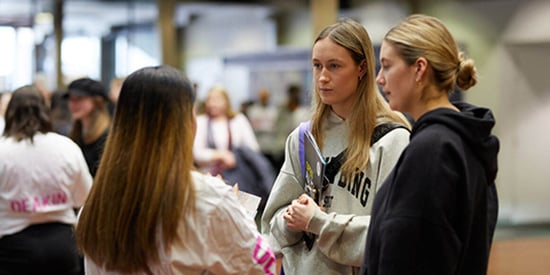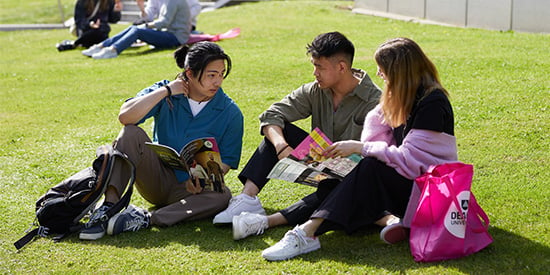Key facts
Locations
Current Deakin Students
To access your official course details for the year you started your degree, please visit the handbook
Course overview
Get high-level skills in theoretical and empirical analysis to interpret global issues.
This course is ideal if you work in public service, the private sector or for a small business, as you will learn how international forces shape your environment.
You’ll develop skills in policy analysis, get a systematic understanding of the threats to peace and security, and global forces shaping political, social and economic life.
The Master of International Relations aims to produce graduates who are able to demonstrate high-level skills of theoretical and empirical analysis and interpret global issues and events. This course will give you a substantial understanding of the complexities of contemporary international relations.
You’ll examine key contemporary issues and developments around the world, particularly in the Asia Pacific region. The program also offers optional postgraduate internships, giving you the opportunity to get experience overseas.
Read MoreCourse information
- Award granted
- Master of International Relations (Professional)
- Year
2024 course information
- Deakin code
- A735
- CRICOS code?
- 108401H Burwood (Melbourne)
- Australian Qualifications Framework (AQF) recognition
The award conferred upon completion is recognised in the Australian Qualifications Framework at Level 9
Course structure
To be awarded a Master of International Relations with a specialisation, a student must successfully complete 16 credit points as follows:
- Academic Integrity Module DAI001 Academic Integrity Module (0-credit-point compulsory unit)
- 6 credit points of core units*
- 10 credit points of study from one of the Minor Thesis, Research Paper, or Professional Experience Pathways. Course Elective units may be used to form a Specialisation
6
Core units
10
Pathway/Elective/Specialisation units
16
Total units
Core Units
Pathways
Minor Thesis - PhD Pathway
Plus 2 credit points of research units:
Plus 7 credit points chosen from the specialisations and/or course electives
Research Paper – non PhD Pathway^
Plus 9 credit points chosen from the specialisations and/or course electives
Professional Experience – non PhD Pathway^
Plus 8 credit points chosen from the specialisations and/or course electives
^ The Research Paper and Professional Experience options are not PhD Pathways.
Specialisations
Students who complete a specialisation of four or more credit points will have the specialisation indicated on their academic transcript.
Specialisations are available in the following areas:
Human Rights and International Law
*Trimester 3 study is required
Intakes by location
The availability of a course varies across locations and intakes. This means that a course offered in Trimester 1 may not be offered in the same location for Trimester 2 or 3. Check each intake for up-to-date information on when and where you can commence your studies.
Trimester 1 - March
- Start date: March
- Available at:
- Burwood (Melbourne)
- Online
Trimester 2 - July
- Start date: July
- Available at:
- Burwood (Melbourne)
- Online
Additional course information
Course duration
Course duration may be affected by delays in completing course requirements, such as accessing or completing work placements.
Mandatory student checks
Any unit which contains work integrated learning, a community placement or interaction with the community may require a police check, Working with Children Check or other check.
Participation requirements
Reasonable adjustments to participation and other course requirements will be made for students with a disability. More information available at Disability support services.
Work experience
Elective units may provide the opportunity for Work Integrated Learning experiences.
Entry requirements
Selection is based on a holistic consideration of your academic merit, work experience, likelihood of success, availability of places, participation requirements, regulatory requirements, and individual circumstances. You will need to meet the minimum academic and English language proficiency requirements to be considered for selection, but this does not guarantee admission.
Academic requirements
To be considered for admission to this degree you will need to meet the following criteria:
- completion of a bachelor degree or higher in any discipline
English language proficiency requirements
To meet the English language proficiency requirements of this course, you will need to demonstrate at least one of the following:
- bachelor degree from a recognised English-speaking country
- IELTS overall score of 6.5 (with no band score less than 6.0) or equivalent
- other evidence of English language proficiency (learn more about other ways to satisfy the requirements)
Admissions information
Learn more about Deakin courses and how we compare to other universities when it comes to the quality of our teaching and learning.
Not sure if you can get into Deakin postgraduate study? Postgraduate study doesn’t have to be a balancing act; we provide flexible course entry and exit options based on your desired career outcomes and the time you are able to commit to your study.
Recognition of prior learning
If you have completed previous studies which you believe may reduce the number of units you have to complete at Deakin, indicate in the appropriate section on your application that you wish to be considered for credit transfer. You will need to provide a certified copy of your previous course details so your credit can be determined. If you are eligible, your offer letter will then contain information about your credit transfer. Your credit transfer is formally approved prior to your enrolment at Deakin during the Enrolment and Orientation Program. You must bring original documents relating to your previous study so that this approval can occur.
You can also refer to the Recognition of prior learning system which outlines the credit that may be granted towards a Deakin University degree.
Fees and scholarships
Fee information
Learn more about fees and your options for paying.
The 'Estimated tuition fee' is provided as a guide only based on a typical enrolment of students completing the first year of this course. The cost will vary depending on the units you choose, your study load, the length of your course and any approved Recognition of prior learning.
One year full-time study load is typically represented by eight credit points of study. Each unit you enrol in has a credit point value. The 'Estimated tuition fee' is calculated by adding together eight credit points of a typical combination of units for your course.
You can find the credit point value of each unit under the Unit Description by searching for the unit in the Handbook.
Learn more about tuition fees.
Scholarship options
A Deakin scholarship might change your life. If you've got something special to offer Deakin – or you just need the financial help to get you here – we may have a scholarship opportunity for you.
Postgraduate bursary
If you’re a Deakin alumnus commencing a postgraduate award course, you may be eligible to receive a 10% reduction per unit on your enrolment fees.
Apply now
Applications can be made directly to the University through StudyLink Connect - Deakin University's International Student Application Service. For information on the application process and closing dates, see the How to apply web page.
Fill out the application form and submit to a Deakin International office or take your application form to a Deakin representative for assistance
For information on the application process and closing dates, see the How to apply webpage.
If you’re still having problems, please contact Deakin International for assistance.
Research Information
Students will complete a research pathway in 1 of the 3 following options:
- Minor Thesis - PhD Pathway
- Research Paper – non PhD Pathway^
- Professional Experience – non PhD Pathway^ .
Entry pathways
Alternative exits
- Graduate Certificate of International Relations (A503)
- Graduate Diploma of International Relations (A603)
Careers
Career outcomes
Career opportunities for international relations graduates exist in all levels of government, private sector corporations and small business, non-government organisations, the media, consultancy, the defence forces, foreign affairs departments, immigration departments, management consultancies, multicultural associations, education, health, politics and research.
For more information go to DeakinTALENT
Course learning outcomes
Deakin's graduate learning outcomes describe the knowledge and capabilities graduates can demonstrate at the completion of their course. These outcomes mean that regardless of the Deakin course you undertake, you can rest assured your degree will teach you the skills and professional attributes that employers value. They'll set you up to learn and work effectively in the future.
| Deakin Graduate Learning Outcomes | Course Learning Outcomes |
| Discipline-specific knowledge and capabilities | Review and analyse major theoretical, conceptual and policy debates and disputes in International Relations pertaining to foreign policy, conflict and security, international and regional politics, globalisation, and international law with reference to empirical cases and apply findings in scholarly practice and in professional practice settings. |
| Communication | Effectively communicate the findings and analyses of International Relations theories, concepts and their application to real-world contexts, in a selection of written, oral and digital formats to a diverse range of audiences in scholarly academic settings and professional contexts. |
| Digital literacy | Employ a range of digital communication technologies and platforms appropriately to conduct research, engage in debate, communicate findings, and deliver reports and presentations to a diverse range of audiences in scholarly academic and professional contexts. |
| Critical thinking | Analyse, critically evaluate, and synthesise theoretical conceptualisations of international politics and policy responses by a range of actors, including those in professional practice settings, in the context of the changing international political system. |
| Problem solving | Employ initiative and creativity in conjunction with appropriate Social Science methods of research and analysis to investigate complex real-world, professional practice problems in a systematic manner and generate and evaluate potential responses to issues in the areas of conflict and security, globalization, international crises and risks, foreign policy, and international law |
| Self-management | Demonstrate autonomy, responsibility, accountability and a continued commitment to learning and skill development personally, academically and professionally in the field of International Relations. |
| Teamwork | Work and learn collaboratively with and from others in the field of International Relations and from other backgrounds including in a professional setting while still maintaining responsibility for their own learning. |
| Global citizenship | Analyse and respond to issues in global politics in domestic, regional, and international contexts as a reflective scholar and practitioner, considering cultural and socio-economic diversity, social and environmental responsibility and adherence to professional and academic ethical standards. |
| Approved by Faculty Board May 2019 | |




